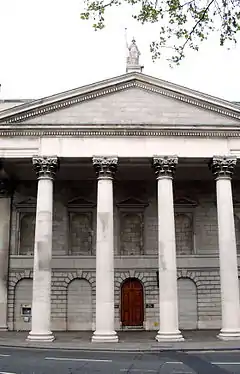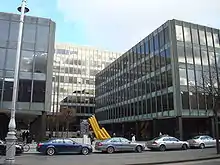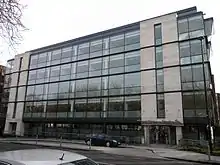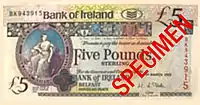Bank of Ireland
Bank of Ireland Group plc (Irish: Banc na hÉireann) is a commercial bank operation in Ireland and one of the traditional 'Big Four' Irish banks. Historically the premier banking organisation in Ireland, the Bank occupies a unique position in Irish banking history. At the core of the modern-day group is the old Bank of Ireland, the ancient institution established by Royal Charter in 1783.[1]
| Type | Public limited company |
|---|---|
| Euronext: BIRG | |
| Industry |
|
| Founded | 5 April 1783 |
| Headquarters | 40 Mespil Road, Ballsbridge, Dublin, Ireland |
Area served | Ireland United Kingdom |
Key people | Patrick Kennedy Governor Francesca McDonagh CEO |
| Products | |
| Revenue | €2,146 million (2018) |
| €2,805 million (2018) | |
| €935 million (2018) | |
| Owner | Government of Ireland (14%) |
Number of employees | 11,086 (2018) |
| Website | bankofireland |
History
Bank of Ireland is the oldest bank in continuous operation (apart from 4 closures due to bank strikes, 1950, 1966, 1970,[2] 1976) in Ireland.
In 1781, the Bank of Ireland Act was passed by the Parliament of Ireland, establishing Bank of Ireland.[3] On 25 June 1783, Bank of Ireland opened for business at Mary's Abbey in a private house previously owned by one Charles Blakeney.[4][5]
On 6 June 1808, Bank of Ireland moved to 2 College Green.[4] In 1864, Bank of Ireland paid its first interest on deposits.[4]
In 1926, Bank of Ireland took control of the National Land Bank.[4][6] In 1948, The Bank of Ireland 1783–1946 by F.G. Hall was published jointly by Hodges Figgis (Dublin) and Blackwell's (Oxford).[7]
In 1958, the Bank took over the Hibernian Bank Limited.[4] In 1965, The National Bank Ltd, a bank founded by Daniel O'Connell in 1835, had branches in Ireland and Britain.[8] The Irish branches were acquired by Bank of Ireland[9] and rebranded temporarily as National Bank of Ireland, before being fully incorporated into Bank of Ireland. The British branches were acquired by Williams & Glyn's Bank.[4]
In 1980, the first Pass card and machine, also known as ATMs, was opened by Bank of Ireland.[10][11] In 1983, Bank of Ireland celebrated its Bi-Centenary and a commemorative stamp was issued. The Bank also commissioned the publication of "An Irish Florilegium" that year.[12] In 1995, Bank of Ireland merged First New Hampshire Bank with Royal Bank of Scotland's Citizens Financial Group.[13]Only branches in Cities and Major towns had ATM in the 1980's but branches in most medium and small towns installed then in the 1990's.
In 1996, Bank of Ireland bought the Bristol and West building society for €882m, which kept its own brand.[14] In 1999, the bank held merger talks with Alliance & Leicester, but they were called off.[15] In 2000, it was announced that Bank of Ireland was acquiring Chase de Vere.[16]
In 2002, Bank of Ireland acquired Iridian, a US investment manager, which doubled the size of its asset management business.[17] In 2005, Bank of Ireland completed the sale of the Bristol and West branch and Direct Savings (Contact Centre) to Britannia Building Society.[18]
In 2008, Moody's Investors Service changed its rating of Bank of Ireland from stable to negative. Moody's pinpointed concerns over weakening asset quality and the impact of a more challenging economic environment on profitability at Bank of Ireland. A share price collapse followed.[19] In 2009, The Irish government announced a €7 billion rescue package for the bank and Allied Irish Banks plc in February.[20] The biggest bank robbery in the history of the state took place at Bank of Ireland at College Green. Consultants Oliver Wyman validated Bank of Ireland's bad debt levels at €6 billion over three years to March 2011, a bad debt level which was exceeded by almost €1 billion within a matter of months.[21][22]
In 2010, The European Commission ordered the disposal of Bank of Ireland Asset Management, New Ireland Assurance, ICS Building Society, its US Foreign Exchange business and the stakes held in the Irish Credit Bureau and in an American Asset Manager followed the receipt of Irish Government State aid.[23] In 2011, the Securities Services Division of the bank was sold to Northern Trust Corporation.[24][25]
In 2013, Bank of Ireland more than doubled interest rates on mortgages tracking Bank of England rates, (which had remained stable for four years), citing the need to hold more reserves and the 'increased cost of funding mortgages'. Described by Ray Boulger of broker John Charcol as 'having shot the reputation of its mortgages to smithereens', nevertheless the bank continues to offer highly competitive mortgages through the Post Office.[26]
In 2014, regulation of the bank was transferred to the European Central Bank.[27] Also in 2014, the bank entered into a marketing alliance with EVO Payments International and re-enters the card acquiring market. BOI Payment Acceptance launches in December 2014.[28]
Role as government banker
Bank of Ireland is not, and was never, the Irish central bank. However, as well as being a commercial bank – a deposit-taker and a credit institution – it performed many central bank functions, much like the earlier-established Bank of Scotland and Bank of England. Bank of Ireland operated the Exchequer Account and during the nineteenth century acted as something of a banker of last resort. Even the titles of the chairman of the board of directors (the Governor) and the title of the board itself (the Court of Directors) suggest a central bank status. From the foundation of the Irish Free State in 1922 until 31 December 1971, Bank of Ireland was the banker of the Irish Government.[4]
Headquarters

The headquarters of the bank until the 1970s was the impressive Parliament House on College Green, Dublin. This building was originally designed by Sir Edward Lovett Pearce in 1729 to host the Irish Parliament, and it was the world's first purpose-built bicameral parliament building.[29]
The bank had planned to commission a building designed by Sir John Soane to be constructed on the site bounded by Westmoreland Street, Fleet Street, College Street and D'Olier Street (now occupied by the Westin Hotel). However, the project was cancelled following the Act of Union in 1800, when the newly defunct Parliament House was bought by Bank of Ireland in 1803.[30] The former Parliament House continues today as a working branch. Today, visitors can still view the impressive Irish House of Lords chamber within the old headquarters building. The Oireachtas, the modern parliament of the Republic of Ireland, is now housed in Leinster House in Dublin. In 2011, the Irish Government set out proposals to acquire the building as a venue for the state to use as a cultural venue.[31]

In the 1970s the bank moved its headquarters to a modern building, now known as Miesian Plaza, on Lower Baggot Street, Dublin 2. As Frank McDonald notes in his book Destruction of Dublin, when these headquarters were built, it caused the world price of copper to rise – such was the usage in the building.[32]

In 2010 the bank moved to its current, smaller headquarters on Mespil Road.[33]
Banking services
Republic of Ireland
The Group provides a broad range of financial services in Ireland to the personal, commercial, industrial and agricultural sectors. These include checking and deposit services, overdrafts, term loans, mortgages, international asset financing, leasing, instalment credit, debt financing, foreign exchange facilities, interest and exchange rate hedging instruments, executor and trustee services.[34]
International Operations
The bank is headquartered in Dublin, and has operations throughout the Republic of Ireland. It also operates in Northern Ireland, where it prints its own banknotes in Pounds Sterling (see section on banknotes below). In Great Britain, the bank expanded largely through the takeover of the Bristol and West Building Society in 1996. Bank of Ireland also provides financial services for the British Post Office throughout the UK and AA Savings. Operations in the rest of the world are primarily undertaken by Bank of Ireland Corporate Banking who provide services in France, Germany, Spain and the United States.
Banknotes

Although the Bank of Ireland is not a central bank, it does have Sterling note-issuing rights in the United Kingdom. While the Bank has its headquarters in Dublin, it also has operations in Northern Ireland, where it retains the legal right (dating from before the partition of Ireland) to print its own banknotes. These are pound sterling notes and equal in value to Bank of England notes, and should not be confused with banknotes of the former Irish pound.
The obverse side of Bank of Ireland banknotes features the Bank of Ireland logo, below which is a line of heraldic shields each representing one of the six counties of Northern Ireland. Below this is a depiction of a seated Hibernia figure, surrounded by the Latin motto of the Bank, Bona Fides Reipublicae Stabilitas ("Good Faith is the Cornerstone of the State").[35] The current series of £5, £10 and £20 notes, issued in April 2008, all feature an illustration of the Old Bushmills Distillery on the reverse side. Prior to 2008, all Bank of Ireland notes featured an image of the Queen's University of Belfast on the reverse side.[36][37][38]
The principal difference between the denominations is their colour and size:
- 5 pound note, blue
- 10 pound note, pink
- 20 pound note, green
- 50 pound note, blue-green
The Bank of Ireland has never issued its own banknotes in the Republic of Ireland. Section 60 of the Currency Act 1927 removed the right of Irish banks to issue banknotes, however "consolidated banknotes", of a common design issued by all "Shareholder Banks" under the Act, were issued between 1929 and 1953. These notes were not legal tender.[39]
Controversies
Michael Soden
Michael Soden abruptly quit as group chief executive on 29 May 2004 when it was discovered that adult material that contravened company policy was found on his Bank PC.[40] Soden issued a personal statement explaining that the high standards of integrity and behaviour in an environment of accountability, transparency and openness, which he espoused, would cause embarrassment to the Bank.[41]
DIRT controversy
An IR£30.5 million tax arrears liability was settled by Bank of Ireland in July 2000. The Bank told the Oireachtas Public Accounts Committee Inquiry that its liability was in the region of £1.5 million. The settlement figure was 'dictated' by the Revenue Commissioners following an audit by the Commissioners.[42] It was in Bank of Ireland that some of the most celebrated of the "celebrated cases" of non-compliance and bogus non-resident accounts have to date been discovered and disclosed. Thurles, Boyle, Roscrea (1990), Milltown Malbay (1991), Dundalk (1989/90), Killester (1992), Tullamore (1993), Mullingar (1996), Castlecomer, Clonmel, Ballybricken, Ballinasloe, Skibbereen (1988), Dungarvan and, disclosed to the Oireachtas Public Accounts Sub-Committee, Ballaghaderreen (1998) and Ballygar (1999). The Public Accounts Sub-Committee Inquiry concluded that "the most senior executives in the Bank of Ireland did seek to set an ethical tone for the bank and unsuccessfully sought Revenue Commissioners assistance to promote an industry-wide Code of Practice.[43]
Stolen laptops
In April 2008 it was announced that four laptops with data pertaining to 10,000 customers[44] were stolen between June and October 2007. This customer information included names, addresses, bank details, medical and pension details.[45]
The thefts were initially reported to the Garda Síochána, however the Banks senior management did not know about the problem until February 2008 after an internal audit uncovered the theft and the Bank did not advise the Data Protection Commissioner and the Central Bank of Ireland until mid-April 2008. It also came to light that none of the laptops used encryption to protect the sensitive data. The Bank has since released a press release detailing the seven branches affected and its initial response,[46] later in the month the Bank confirmed that 31,500 customer records were affected as well as an increased number of branches.[47]
Record bank robbery
On 27 February 2009, it was reported that a criminal gang from Dublin had stolen €7 million from the Bank of Ireland's main branch in College Green. The robbery was the biggest in the history of the Republic of Ireland, during which a girlfriend of an employee, her mother and her mother's five-year-old granddaughter were held hostage at gunpoint. Gardaí arrested six men the next day, and recovered €1.8 million. A spokesperson for the bank said: "Bank of Ireland's priority is for the safety and well-being of the staff member and the family involved in this incident and all of the bank's support services have been made available to them."[48]
Wrong information on recapitalisation and bonuses
The information provided to the Department of Finance in 2009 in advance of a recapitalisation of the bank which cost the taxpayer €3.5 billion "was incomplete and misleading". It also gave wrong information to the Minister for Finance who in turn misled the Dáil on €66 million in bonuses it paid since receiving a State guarantee. External examiners found it used "a restrictive and uncommon interpretation of what constituted a performance bonus".[49] Their report also found that there had been "a catalogue of errors" and that the information supplied by Bank of Ireland to the Department of Finance was "presented in a manner which minimised the level of additional payments made".[50] The Bank paid €2 million by way of compensation to the Exchequer for providing "misleading" information.[51][52][53]
Relationship with outsourcing companies
The Bank has forged strong links with IT outsourcing companies since 2004 or earlier. On 1 November 2010 IBM won the $450M full scope outsource contract to manage BoI Group's Information Technology (IT) infrastructure services (e.g. mainframe, servers, desktops and print services) in a competitive bid against HP (the incumbent outsource provider) and HCL. This follows on from the Bank's natural expiration of its current agreement with HP, which was signed in 2004.
Following a competitive bid process with a number of parties, IBM was selected for exclusive contract negotiations in July 2011. During the intervening period, an extensive due diligence phase has been undertaken and relevant regulatory approval has been granted. IBM will manage the Group's entire IT infrastructure, including desktop systems, servers, mainframes, local area networks and service desk.[54] Since then, BOI has given HCL a €30m Business Process Outsourcing contract and has selected them as strategic local resourcing partner in Ireland. In addition to that, HCL have opened a software factory for Bank of Ireland in India and has started to outsource production support for the retail banking and payments applications in BOI.[55] This exclusive relationship with HCL has been seen as controversial in the context of the substantial Irish taxpayer investment in Bank of Ireland – and the lack of any significant investment by HCL in Ireland. A banking analyst said in July 2011 that BOI's IT system is "very antiquated."[56]
Closing accounts associated with Palestine
Bank of Ireland closed the accounts of Irish Palestine Solidarity campaign citing that the bank considered Palestine a high risk country. Sinn Féin TD Mary-Lou McDonald called this outrageous and an insult to the Palestinian people.[57]
2008 share price collapse
On 5 March 2009, the shares reached €0.12 during the day, thereby reducing the value of the company by over 99% from its 2007 high. At the 2009 AGM, shareholders criticised the performance of their Auditors, PriceWaterhouseCoopers.[58]
The Central Bank told the Oireachtas Enterprise Committee that shareholders who lost their money in the banking collapse were to blame for their fate and got what was coming to them for not keeping bank chiefs in check, but did admit that the Central Bank had failed to give sufficient warning about reckless lending to property developers.[59]
References
- "Banks need fresh €24 billion – Central Bank". RTÉ News. 31 March 2011. Archived from the original on 3 April 2011. Retrieved 31 March 2011.
- "How six-month bank strike rocked the nation". The Independent. 29 December 1999. Retrieved 6 July 2020.
- Bank of Ireland Act 1781 (Public Act No. 16 of 1781). Act of the Oireachtas.
- "Bank of Ireland History". Bank of Ireland. Archived from the original on 30 November 2010.
- Barter, Pavel. "Bank of Ireland pressed to open up archive that dates to 1783". ISSN 0140-0460. Retrieved 14 October 2020.
- Cheminant, Keith Le (27 November 2012). Colonial and Foreign Banking Systems (RLE Banking & Finance). Routledge. p. 125. ISBN 978-1-136-26513-6.
- Shirras, G. Findlay (March 1950). "Review of The Bank of Ireland, 1783-1946". The Economic Journal. 60 (237): 139–142. doi:10.2307/2227223. JSTOR 2227223.
- Molloy, Tom (9 May 2013). "Daniel O'Connell set up a bank. Who will be next?". The Independent. Retrieved 6 July 2020.
- McCabe, Conor (1 June 2011). Sins of the Father: Tracing the Decisions that Shaped the Irish Economy. The History Press. ISBN 978-1-84588-719-3.
- "First ATM in Ireland". RTÉ Archives. Retrieved 14 October 2020.
- "Ireland's First ATM". RTÉ Archives. Retrieved 14 October 2020.
- "RNZIH - Book Review - An Irish Florilegium II". www.rnzih.org.nz. Retrieved 6 July 2020.
- Baker, Frank (18 December 1995). "Citizens, First NH Announce Merger Plans". Associated Press. Archived from the original on 6 April 2019.
- Brignall, Miles (9 January 2000). "After 158 years, the end is nigh for Bristol & West". The Guardian. Archived from the original on 23 March 2019.
- "Alliance & Leicester scraps Bank of Ireland merger plans". Money Marketing. 18 June 1999. Archived from the original on 20 July 2013.
- English, Simon (29 July 2000). "Ireland bank buys Chase de Vere". The Telegraph. Archived from the original on 23 March 2019.
- Reid, Dickon (16 May 2002). "Bank of Ireland AM moves into US by buying Iridian". Investment & Pensions Europe. Archived from the original on 6 April 2019.
- Osborne, Hilary (24 May 2005). "Britannia to acquire Bristol & West". The Guardian. Archived from the original on 23 March 2019.
- Bank of Ireland shares plummet to 83 cent RTÉ News, 30 January 2009
- "BoI, AIB shares rebound after early falls". The Irish Times. 17 February 2009. Archived from the original on 27 March 2016.
- "Comment". The Sunday Business Post. 8 August 2010. Archived from the original on 1 October 2011. Retrieved 22 December 2012.
- Capital Raising Announcement and Interim Management Statement 12 February 2009
- "EU Restructuring Plan – Bank of Ireland ROI" (PDF). Bankofireland.com. Retrieved 22 December 2012.
- "The Governor and Company of the Bank of Ireland Sale of Bank of Ireland Securities Services". Bank of Ireland. 24 February 2011. Archived from the original on 26 July 2011. Retrieved 22 December 2012.
- Brennan, Joe; Doyle, Dara (24 February 2011). "Bank of Ireland to Sell Fund Services Arm to Northern Trust". Bloomberg. Archived from the original on 14 August 2011.
- The Guardian 02.03.13
- "The list of significant supervised entities and the list of less significant institutions" (PDF). European Central Bank. 4 September 2014. Archived (PDF) from the original on 3 October 2018. Retrieved 4 October 2014.
- "Bank of Ireland signs major long-term deal with EVO Payments International". Bank of Ireland. 3 September 2014. Archived from the original on 8 September 2014.
- Caldwell, David (12 October 2008). "Architecture Group – Irish Parliament Building". Archived from the original on 12 August 2011. Retrieved 24 May 2011.
Bank of Ireland, College Green ... is the world's first purpose-built two-chamber parliament house.
- "The House of Lord's Dublin". Anchor House Dublin. Archived from the original on 2 April 2019. Retrieved 24 May 2011.
The Parliament House was purchased by "The Bank of Ireland" in 1803.
- Cullen, Paul (14 May 2011). "Government wants to repossess landmark College Green bank". The Irish Times. Archived from the original on 17 October 2011. Retrieved 14 May 2011.
- McDonald, p. 111
- O'Mahony, Brian (15 January 2010). "Bank of Ireland will move its HQ by March". Irish Examiner. Retrieved 10 April 2020.
- Bank of Ireland: Personal Banking Archived 6 January 2016 at the Wayback Machine
- "Bank Notes: £5 note Bushmills 2013 Series". Bank of Ireland. Archived from the original on 17 July 2015. Retrieved 30 March 2016.
- "Bank Notes". Bank of Ireland. Archived from the original on 20 March 2016. Retrieved 30 March 2016.
- "Bank of Ireland to feature Old Bushmills Distillery on new Northern Ireland note issue". Bank of Ireland. 11 February 2008. Archived from the original on 8 March 2016. Retrieved 30 March 2016.
- "Bank raises glass to famous drink". BBC News. 23 April 2008. Archived from the original on 3 May 2014. Retrieved 30 October 2008.
- Currency Act 1927 Archived 3 March 2016 at the Wayback Machine
- "Bank of Ireland chief quits over PC porn". The Register. 1 June 2004. Archived from the original on 14 July 2006. Retrieved 15 August 2006.
- "Personal statement by Michael D. Soden Group Chief Executive Bank of Ireland" (PDF). Michael D. Soden. 29 May 2004.
- Creaton, Siobhan (6 July 2000). "Revenue set to claw back bonanza in unpaid taxes". The Irish Times. Archived from the original on 6 April 2019.
- "Public Accounts Committee Parliamentary Inquiry into DIRT". 27 September 1999.
- Data theft involving 10,000 bank records RTÉ News, 21 April 2008
- BoI kept quiet about stolen client details since February Irish Independent, 23 April 2008
- Bank of Ireland Life – Customer Update on Stolen Laptops Archived 19 November 2010 at the Wayback Machine Bank of Ireland Press Room, 22 April 2008
- Bank of Ireland Life – Update on Stolen Laptops Archived 19 November 2010 at the Wayback Machine Bank of Ireland Press Room, 28 April 2008
- Sharrock, David (27 February 2009). "Kidnap gang steals €7 million from Bank of Ireland". The Times.
- Collins, John (7 March 2011). "Bonus row shows Bank of Ireland is no better than rest". The Irish Times. Archived from the original on 20 April 2013.
- "The Great Escape". Irish Independent. 16 April 2011. Archived from the original on 10 August 2016.
- "Investigation exposes Bank of Ireland bonus payments". BreakingNews.ie. 3 March 2011. Retrieved 22 December 2012.
- "BoI paid €66m in bonuses from 2008–2010". RTÉ News. 4 March 2011.
- "Bank of Ireland Statement on Bonuses". Bank of Ireland. 4 March 2011. Archived from the original on 7 August 2011. Retrieved 22 December 2012.
- Mishra, Pankaj (2 June 2010). "Bank of Ireland shortlists IBM, HCL for $600-mn outsourcing deal". The Economic Times. Archived from the original on 9 May 2012.
- Curran, Richard (13 March 2011). "Bank of Ireland hires Indian outsourcing firm". The Sunday Business Post. Archived from the original on 17 August 2011. Retrieved 22 December 2012.
- Lynch, Andrew (9 October 2011). "Russian roulette". The Sunday Business Post. Archived from the original on 12 October 2011. Retrieved 22 December 2012.
- "Bank closes accounts of Palestine advocacy group". RTÉ.ie. 2 October 2016. Archived from the original on 23 March 2019.
- O'Farrell, Stephen (4 July 2009). "Anger smoulders but the fury has gone". Irish Independent. Archived from the original on 28 April 2016.
- "Top official says shareholders to blame for the banking crisis". The Herald. 30 July 2009. Archived from the original on 3 June 2012. Retrieved 22 December 2012.
Sources
- McDonald, Frank (1985). The destruction of Dublin. Gill and Macmillan. ISBN 978-0717113866.